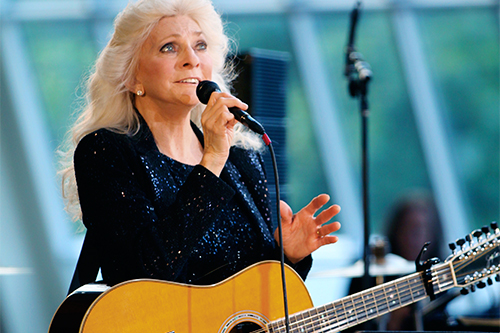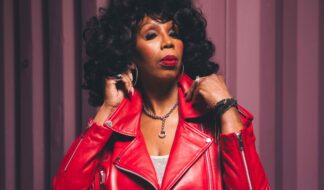
The first time I saw Judy Collins in a live setting I was struck by her hair – with those long, silvery locks, she could've been an angel. That magical night three years ago at the Ann Arbor Folk Festival, when the folk legend headlined, she sure sounded like one. Collins, who rose to fame with hits such as "Both Sides Now" and "Send in the Clowns," returns to perform to a sold-out crowd on June 22 at The Ark, where she'll share pieces of her half-century career – the only thing longer than her hair.
During the past five decades, the 75-year-old songstress has released more albums than even she can count (her first, 1961's "A Maid of Constant Sorrow," was released when John F. Kennedy had just been elected president), she's been a tireless champion for women and civil rights, and is currently working on her 10th book. Even if she's not an angel, there's something superhuman about Judy Collins.
You must like us here, because it seems you come around just about every year.
They like me there, so that's why I'm there every year! (Laughs)
You've performed all over the world, and you released "Judy Collins: Live in Ireland" earlier this year. How has traveling inspired you as a songwriter?
It's what I do, so it's part of the fabric of my life. I've never not traveled. Out of all of the years I think I've had just a couple where I haven't traveled, but not much. It's very inspiring to drive through the mountains somewhere, to have a notebook handy, to be working on something.
I do a lot of work on the road. I've written a number of books that have been in great part inspired by being out on the road, having time and being isolated. It's been very helpful. There are so many wonderful places that I get to see and people I get to meet – it really is remarkable.
One thing I've always admired about you is this appreciation you have for people, for the human condition – something your music has always reflected. Where did you learn empathy and compassion?
I came from a family where that was essential. If you didn't have that in your character we didn't talk to you. (Laughs)
So what you're saying is you had no empathy for people with no empathy?
(Laughs) The barn door would shut around someone who didn't have those things. I wasn't very, I suppose, embracing of people who didn't feel good about humanity and who didn't wanna do something to help humanity. I mean, that would be the bottom line for friendship, for sure.
What was the catalyst for your humanitarian work and social activism?
The family. My mother drove a Red Cross truck during the war in California and my father was just an amazing man. When you come into a life with a musician who is an entertainer, who's a popular radio performer and who has a huge audience who loves him and adores him, you're gonna immediately be exposed to socially important benefits that you are invited to do and that you really have to do. I learned very early that comes with the territory, so whatever you believe in you can support, helping to make a difference. That's certainly part of my own legacy that I learned at home. So, I do benefits, and of course I go and sing for one or another causes. Again, that's part of an ongoing commitment. I try to be helpful to things I believe in.
As someone who was very involved in the civil rights movement, what do you think of the movement currently going on with gay rights?
It's so exciting. It's about time! We've had a very tragic history in that regard and now we're coming of age, I think. Many of my friends were gay, but that was natural. You didn't make anything of it. It was natural. You'd have many good friends that were gay and that's that. It was part of life. But of course the legal and the moral and the issues with the armed services and the church – it's disgusting to think that we had to go so far in the other direction before we got smart.
And now we're seeing state after state legalize marriage for gay couples.
It's absolutely wonderful.
You've sung with Joan Baez and you've interpreted Stephen Sondheim, so you must know that you have a gay following.
Gosh, I hope so! I pray that's true. I've done some work with the gay choirs from around the country that I love. Many of my friends are gay. It's just so natural to me I wouldn't even think of it so much, really. (A gay following) must have been a part of my history to begin with, and I'm hoping that it gets stronger as I become more accessible to more people.
What's the key to interpreting a song that isn't yours?
You have to sing it like Judy Collins. (Laughs)
To be able to record Joni Mitchell's "Both Sides Now" and win a Grammy for it must have been an enormous coup.
Oh yeah, it was wonderful. It's great to have a big hit with a song that is so good that you can sing it for your whole life, and that's what I've done. I like to make it fresh every time, which is the job of the performer, and I try to live up to it. I hope I do.
What makes a song timeless?
I have no idea. Can't ask me. A critic might know that but I don't. It's a mystery. It's a mysterious form of art. I mean, what makes a painting timeless? The same subject matter by Picasso could be timeless and something by somebody else could be just a painting.
But you seem to pick songs that are timeless. You've recorded songs written by The Beatles, Leonard Cohen, Randy Newman, all of whom have endured.
I'm very lucky, yeah. It's like a heat-seeking operation – you go where the heat is. In other words, you go where you feel something, where you feel moved, compelled and inspired. And then you try to do the best to sing it so that you like it. I mean, I have to like it first, after all. I'm the first one who gets the pleasure of it. (Laughs)
So, you have good instincts, because you always seem to pick the right songs.
They're educated instincts. They're educated by my father's incredible taste in music and his great, great talent. I watched him do that as I grew up. I watched him choose the songs, perform the songs, make them his own and move people to tears or laughter. I learned how to do that because I watched him do it all the time. So, you need a mentor. If you don't have a mentor, you have to go find one. I had one. I had him in my house. (Laughs)
You've been very forthright in acknowledging your rough patches. What role has music played in helping you persevere through some of those darker times?
Music has saved my life entirely. I was a very serious alcoholic and very sick, and from the beginning of my life, it was music that lifted me. That allowed me to have some peace in the midst of chaos.
You've recorded 50 albums…
Something like that!
What song do you most want to be remembered by?
"Amazing Grace" will be the one whether I like it or not.
When people call you a legend, as they often do, what does that mean to you?
It means that I have more to live up to and that they expect the best from me and that I try always to live up to the best that I can be in every way – physically, emotionally, spiritually in terms of my work. My job is to keep that edge, and to keep writing. I'm working on a new book now, another hanging-it-all-out book about my eating disorder (Collins suffered from bulimia after she quit smoking in the 1970s), and so it's always out there beckoning. And I have a lot of dreams. I have so much going on in my life that is internal.











